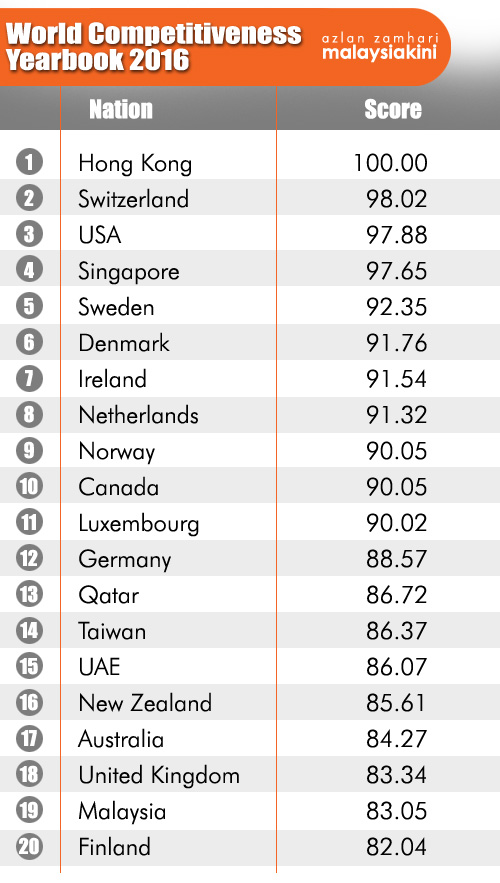Malaysia maintained its top 20 position among 61 global economies in the World Competitiveness Yearbook (WCY) 2016 published by the World Competitiveness Centre of the Institute for Management Development in Lausanne, Switzerland.
However, the country fell five spots to 19th from 14th last year, due to the fall in commodity prices, a strong dollar and the deterioration of balance sheet in both the private and public sectors, International Trade and Industry Minister Mustapa Mohamed said in a statement.
The rankings were assessed for 61 countries this year as compared to 60 last year. The top five countries are Hong Kong, Switzerland, the United States, Singapore and Sweden.

Mustapa said Malaysia was ranked ahead of Finland (20th), Israel (21st), Belgium (22nd), Iceland (23rd), Austria (24th), China (25th), Japan (26th), Czech Republic (27th), Thailand (28th) and South Korea (29th).
In its summary, the WCY listed Malaysia as first among 31 economies with Gross Domestic Product (GDP) per capita of less than US$20,000, retaining its number one position for three consecutive years.
"Among 28 countries with populations above 20 million, we ranked seventh. In Asean, Malaysia remained in second position, and was ranked sixth among 14 countries in the Asia-Pacific region," Mustapa said.
'Malaysia needs to up its game'
He pointed out that global economic uncertainties mean that Malaysia needs to up its game.
He said the ranking makes clear year after year that current economic growth is by no means a guarantee of future competitiveness, and that the common pattern among all of the countries in the top 20 is business-friendly regulation, physical and intangible infrastructure and inclusive institutions.
Malaysia was ranked 14th in Business Efficiency, and was among the top 10 in Labour Market at sixth (2015: fourth) and Management Practices at ninth (2015: sixth), while it improved three places in Productivity and Efficiency to 21st (2015: 24th).
The country declined in Finance and Attitudes and Values by five and three places to 20th and 11th respectively.
Mustapa said robust economic growth is crucial to ensure Malaysia achieves its aspiration of becoming a developed nation by 2020.
"In this context, our initiatives under the Government Transformation Programme and Economic Transformation Programme will continue as spelled out in the 11th Malaysia Plan.
"The government's development strategy under the 11th Malaysia Plan outlines productivity as a game changer to achieve sustainable and inclusive growth.
"We are also focusing on transforming our manufacturing industry in accordance with the rapid changes brought upon by what some call the ‘Fourth Industrial Revolution'," he said.
The WCY 2016 is based on an analysis of more than 340 criteria derived from four factors: Economic Performance, Government Efficiency, Business Efficiency and Infrastructure.
Malaysia declined five spots in Economic Performance to 11th from sixth in 2015.
The declines in the Domestic Economy sub-factor to 22nd (2015: 15th), International Trade to 21st (2015: 11th) and International Investment to 16th (2015: eighth) contributed to the overall decline of the Economic Performance factor, while the country retained its top 10 position in two sub-factors - Employment at ninth (2015: seventh) and Prices at seventh (2015: third).
- Bernama

